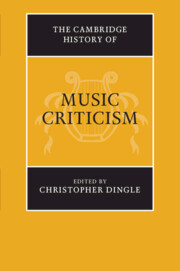Book contents
- The Cambridge History of Music Criticism
- The Cambridge History of Music
- The Cambridge History of Music Criticism
- Copyright page
- Contents
- Music Examples, Figures and Tables
- Notes on Contributors
- Acknowledgements
- Introduction
- Part I The Early History of Music Criticism
- 1 Speaking of Plainsong in the Middle Ages
- 2 Music Criticism in the Late-Medieval and Renaissance Era
- 3 Musical Discourse in Italy, 1500–1800
- 4 Music Criticism in France before the Revolution
- 5 Music Criticism in Britain up to Burney
- 6 German-Language Music Criticism before 1800
- Part II The Rise of the Press
- Part III Critical Influence and Influences
- Part IV Entering the Twentieth Century
- Part V New Areas
- Part VI Developments since the Second World War
- Postlude
- Bibliography
- Index
6 - German-Language Music Criticism before 1800
from Part I - The Early History of Music Criticism
Published online by Cambridge University Press: 21 August 2019
- The Cambridge History of Music Criticism
- The Cambridge History of Music
- The Cambridge History of Music Criticism
- Copyright page
- Contents
- Music Examples, Figures and Tables
- Notes on Contributors
- Acknowledgements
- Introduction
- Part I The Early History of Music Criticism
- 1 Speaking of Plainsong in the Middle Ages
- 2 Music Criticism in the Late-Medieval and Renaissance Era
- 3 Musical Discourse in Italy, 1500–1800
- 4 Music Criticism in France before the Revolution
- 5 Music Criticism in Britain up to Burney
- 6 German-Language Music Criticism before 1800
- Part II The Rise of the Press
- Part III Critical Influence and Influences
- Part IV Entering the Twentieth Century
- Part V New Areas
- Part VI Developments since the Second World War
- Postlude
- Bibliography
- Index
Summary
In May 1722 Johann Mattheson published the inaugural issue of Critica musica, the first known periodical devoted to music criticism. Focusing on the appraisal of music theory, this journal defined the purpose of criticism as ‘for the most feasible uprooting of all coarse errors and the promotion of a better growth of the pure harmonic science’. Mattheson used the metaphor of an overgrown garden to convey his belief that critics should weed out musical faults: ‘I have become somewhat severe about the beautiful musical garden, and will not fail to uproot the old, deep-rooted, stiff, prickly, wild, barbaric briars.’ He explained that the regular rhythm of periodical publication suited his critical mission to shape wider opinion: ‘In today’s lifestyle only rarely will people read a whole book, but they will more readily read through a few pages every month. In this format the [critical] onslaught is always new, and, like a steady drip of water, is able finally to make holes here and there in the rock.’
- Type
- Chapter
- Information
- The Cambridge History of Music Criticism , pp. 104 - 124Publisher: Cambridge University PressPrint publication year: 2019
- 2
- Cited by

